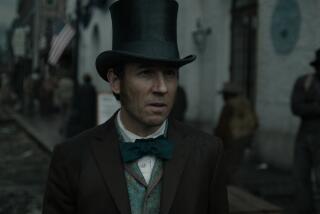To serve a butler
- Share via
While researching a piece for the Indiana Repertory Theatre, James Still, the group’s award-winning playwright-in-residence, came upon a yellowed newspaper clipping about Alonzo Fields -- an African American man who served as the chief White House butler for 21 years. After poring over Fields’ autobiography and documentary interviews with the butler, Still wrote “Looking Over the President’s Shoulder,” a one-man play running through Feb. 23 at the Pasadena Playhouse.
The monologue, starring John Henry Redwood, gives a glimpse into the lives of four presidents against a backdrop that takes in the end of Prohibition, the bombing of Pearl Harbor and changing race relations. Though Fields died in 1994, Still says his story has a lasting resonance.
You’ve called it poetic justice, almost subversive, giving Alonzo Fields his say.
For all those years, Fields was supposed to silently observe without cracking a smile. Now he’s talking for two hours. This is a celebration not only of his life, but of those who silently did service. I was disappointed to find out that Fields was dead because I wanted to say, “Your life mattered.” He spoke four languages and was very musical but had to defer his dream. Rather than becoming an opera singer, he incorporated art into his work.
How did you manage to get close enough to draw such an intimate portrait?
Fields was a pack rat who kept diaries, records of everything -- napkins, check stubs, a program from the night Marian Anderson performed at the White House on the same program with Kate Smith. Through Mayland, his widow, I discovered an out-of-print biography -- buried treasure to me. Still, it was less of a voice than I expected because anything that smacked of “angry black man” was taken out.
The black community, in fact, never embraced Fields. Was that a source of frustration?
Of course. After he retired, Fields went on the TV talk-show circuit. And though he became a popular speaker, he was never invited to talk to an African American group. They didn’t regard him as a role model -- being a butler smacked of subservience, I think. Even today, our efforts to reach an African American audience have met with limited success. Fields wasn’t an Uncle Tom. He didn’t rant and rave but let the facts speak for themselves.
Recalling how FDR had the servants eat in the kitchen at Hyde Park, he wrote: “If the White House doesn’t lead, who will follow?” And he was able to draw the line. When some movie stars came to FDR’s White House for a March of Dimes fund-raiser, Errol Flynn -- who’d had a lot to drink -- lifted up a young woman so she could touch the chandelier in the State Dining Room; Fields, the protector of the room, asked him to put her down. “If I had 2 cents, I’d teach you a lesson,” the actor fumed. Fields threw a nickel at him. “Keep the change,” he said. He had a great sense of self.
Any surprises unearthing this material?
Mainly, how different each [presidential] family was. Life in FDR’s White House was a free-for-all, in sharp contrast to the more formal environment under Herbert Hoover, who wore a tux to dinner even when he dined alone. Roosevelt, though, was an aristocrat who never treated Fields like an equal. It was Harry Truman who grabbed Fields by the arm and sought out his opinion. Racism, I discovered, was also evident under the Eisenhower regime. The president and Army chief of staff Gen. George Marshall opposed the integration of the armed forces. I didn’t learn much about things like Lucy Mercer’s affair with FDR, but, then, Fields didn’t write a kiss-and-tell book. That wasn’t who he was.
-- Elaine Dutka
More to Read
The biggest entertainment stories
Get our big stories about Hollywood, film, television, music, arts, culture and more right in your inbox as soon as they publish.
You may occasionally receive promotional content from the Los Angeles Times.










